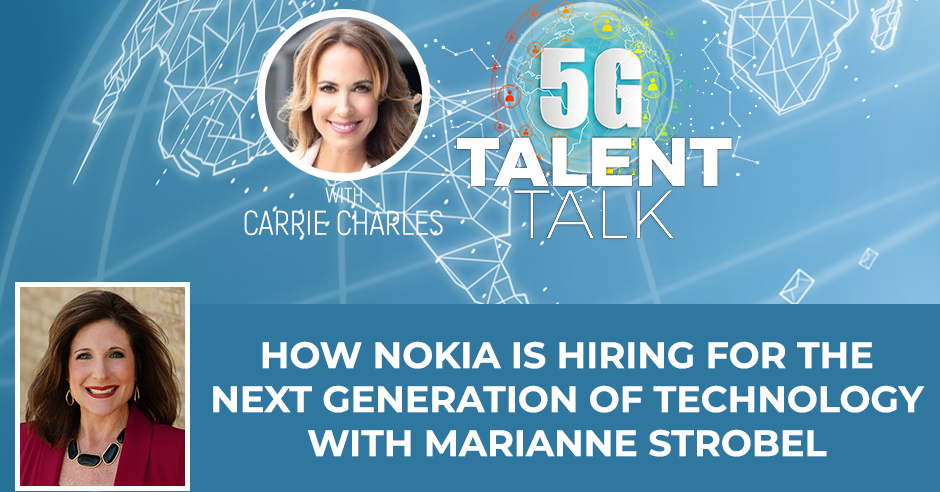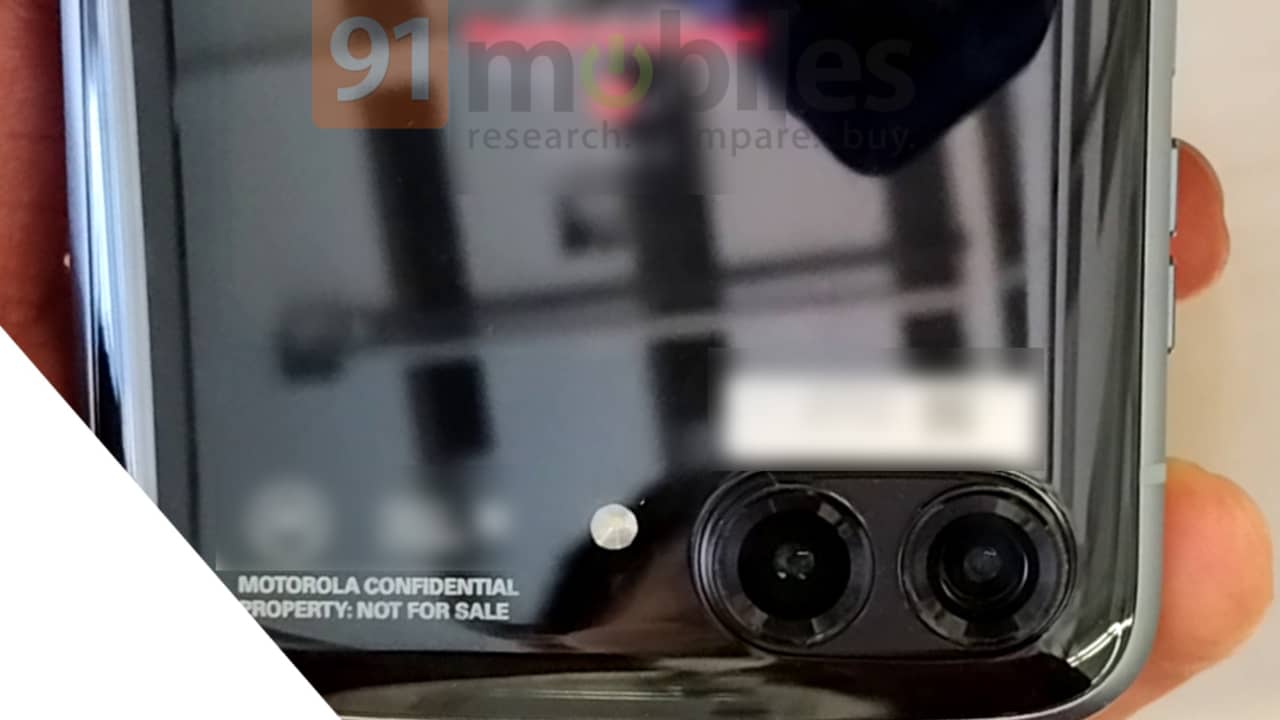Nokia is one of the biggest 5G players, not only in the US but in the whole world. As it embraces the next generation of technology, it is going to need to upscale its talent pool to meet new challenges. How does Nokia replenish its talent well, externally and internally? Joining Carrie Charles to talk about this is Marianne Strobel, the tech giant’s Head of North America Customer Marketing and Communication. Marianne shares how the company chooses and accepts new hires and how it develops leaders and employees internally. She also gives us a glimpse of Nokia’s global culture and how it affects the way the organization works. Nokia has long been a leader in the telecommunications industry, and the way things are going, would probably remain so for a very long time. This interview helps us understand why.
—
Listen to the podcast here:
How Nokia Is Hiring For The Next Generation Of Technology with Marianne Strobel
Nokia is a leader in the development and deployment of 5G networks offering equipment, software services, and licensing across the globe. The company’s corporate culture is one of its competitive advantages. We’re going to find out the secrets behind Nokia’s success and how they hire for the next generation of technology. I’m super excited to have with me as my guest, Marianne Strobel. Marianne is Nokia’s head of North America field marketing, including customer operations, enterprise, and software business groups. Marianne, thank you so much for joining me. I’m excited to begin our conversation.
Thanks, Carrie, for having me.
Talk a little bit more about Nokia’s role in 5G.
We are a leading 5G player not only here in the United States, but around the world. 5G is the technology that is a game-changer. What it’s going to do with many of our service providers and even into enterprise businesses is going to give you more speed, bandwidth and opportunities to do more things from a network perspective to where it’s going to improve connectivity. It’s going to improve productivity and also, it’s going to improve the ROI for any business to the end-users. We are deploying all around the world. We have great success, and we are thrilled to be part of this next generation of technology.
Let’s talk a little bit about the workforce. For the first time in history, there are five generations in the workforce. What challenges do you see that these presents? Are there any particular skills that Millennials or Gen Zs need to have to be successful in this new world of work?
Carrie, it is an amazing time and I call it an amazing combination of a workforce to have because you’ve got people that bring in new talent, new eyeballs looking at things and interweaving with those that are experienced that have the proven track record in battle scars. There are many opportunities to learn on-the-job training. It’s where a lot of the collaboration will help those that have been in the business bring those that are entering into the business up to speed and part of this amazing journey. If we look at Millennials specifically, they have expectations. It’s all about not just the pay, but also how they can advance to the next level. They’re looking at the deployment of a well-defined career path. How fast can I move up? If they don’t like the environment, they will move on.
They will find a new opportunity quickly. When we look at this workforce, it is the responsibility of the business leader to set expectations upfront, manage, and to nurture along the way. Coaching and developing are key and having that hands-on interaction proves itself to be successful. I would also say that the first 90 days are critical in any new hire, but with Millennials, they need to have clear and specific instructions. This group of talent is educated with degrees that do not exist just from the books. They have experienced where they’ve done a lot of the things that they’ve learned in the classrooms to where they’ve done things on themselves. This is what’s bringing that experience into this new workforce. It will make us successful in the future.
If you want to land the job you want, don’t just go to the HR person; network with the executives behind the hiring decisions. Click To Tweet
One of the reasons why I’m excited to have you on the show is because of your expertise in marketing. Recruitment marketing has become a buzz word in the past few years. I’ve studied it. I’ve spoken about it. It’s no longer just enough to place an ad on a job board or put a job description out there on Indeed and expect everyone to come to you. Times have changed. I wanted to talk to you a bit about recruitment marketing, strategies for finding talent in this new talent landscape, social media, and texting. What do we do? How do we become successful in recruitment these days?
It has turned into an art over the last couple of years. It’s depending on who your audience is. The one thing that I’ve learned even as I was in a job search is depending on whether you’re a Millennial, a Gen X-er, or a Baby Boomer. There’s going to be different kinds of media that you’re going to go to. In this day and age, you can’t post to LinkedIn, or you can’t just respond to an ad on Indeed and then wait for the phone to ring. You’ve got to do a lot of things no matter who you are and how much experienced you are. It’s all about networking. One of the things I always coach people on is to make sure that the resume has all key points on there that do describe who you are, your experience, and how you solve a problem. Having that ROI into what your contribution has resulted in is an eye-opener.
The second thing I would also recommend is that one that is looking for an opportunity is to look at social media as your tool. It is to look at LinkedIn as your tool. It is also to look at Instagram as your tool. Companies are using these tools to reach out to the masses to advertise about the particular positions that they have available, but also networking. If you look at who you are trying to target and get into the company, aim high. Start with that VP of marketing. Don’t go immediately to the hiring HR person. Go and find out who that potential boss would be. I’d say it’s networking, it’s talking to people within the company. It’s talking to networking groups that know somebody that has a friend that works and you’ll work your way there. Those are some of the key things that are successful.
I love what you said about going to the person that’s hiring, go to the VP. Don’t just go to the HR department. The first thing that candidates will think of is, “I’m going to go to the HR recruiting department or recruiter because that’s who’s in charge.” Go straight to the source. It’s okay. There’s no protocol. Be brave, be bold.
Be brave, be bold and start at the top because all they’re going to do is forward it on to the person that’s making that decision. If you’re going to that HR person per se, they’re not going to funnel it up. You may be stuck in HR. I figured to go to whoever’s making that hiring decision and ask, who is the person making the hiring?
You have to be bold these days especially in our economic climate. Let’s talk about future leaders. I think this is a hot topic for any leadership organization. Our leaders are retiring. Our leaders are moving on, moving up, sideways in different spaces and we have to develop a new generation of leaders, succession planning, and growing a bench. What do you see as strategies to build this bench and develop leaders? What if we don’t do it? Is there some sort of a looming crisis ahead of us?
I can speak for the telecom industry-particular, but I think it applies to all industries is skills that one needs to have, especially in this environment. You got to be a self-starter. This is one to where you harness what you’ve got to do and how you’re going to do it. Having that critical thinking, being able to jumpstart yourself, and making sure that you can take the ball and run with it. Analytical skills are key. You don’t have to be a mathematician, but you need to understand the analytics around what you are doing. This is something even from a marketing perspective. It’s great that we use social media, but what’s with the analytics behind all of that social media that we’re using?

Nokia 5G Talent: What’s immediately striking about Nokia culture is that everybody will make sure that you are set up for success.
Also, interpersonal skills. You’re going to need to talk with people from all different levels, all different age groups, and all different walks of life. You have to have those interpersonal skills in order to be successful. Time management, project management, and ask lots of questions. Before you jumpstart, ask the question, so you know what the expectation is, what the deliverables are, and then what is required for you to do the job done. A lot of people don’t do this. They assume. I always say, “When you make assumptions, you make mistakes.” We can qualify as leadership skills but there’s a little bit more to it.
I’ve heard so much about Nokia’s culture. We must hear the word company culture thousands of times per day, and sometimes even start tuning it out. It is important to the new generations. It’s important to every employee, especially more important now as we are working remotely and we’re a little bit more disconnected. Please talk about the Nokia culture. There’s been many case studies and essays on your culture. It is something special.
I’ve always worked for US-based companies. What I find in working with Nokia is a global company. It’s an international company so you get an international culture. You learn different cultures about people around the world. What I experienced coming into Nokia immediately is that everybody is there. They’ll stop and help you. They will make sure that you are set up for success. What amazed me is that it’s not this, “Hurry up, let’s go do things.” It’s, “Let’s make sure that you understand what it is that you’re being asked and how can we help you.”
My first 90 days coming as an outsider into a company, I had more people reaching out to me to say, “How can I help you? These are some of the shortcuts. These are people that you need to know.” It made my first 90-day experience one that was less stressful and something that I harness. It’s one of those that you continue to morph into that culture where it is respect for one another, respect for our people, and respect for the culture. It’s all about how we grow together as an organization. We’re much all rowing in the same boat and that’s what I love about this company.
Discuss some of your programs to attract and develop talent. I know you have some powerful programs in the area of internships and STEM. We discussed a little bit about your employee surveys. Also, I think this is a powerful strategy for retention, development and growth.
As an employee, we have many programs to where we make the time and we enforce with our employees to take the time for self-development. There are ongoing personal development classes. There are ways of taking that time to invest in yourself. That is number one in the culture. We have all kinds of things going on internally for the internal employee to best present with their skillsets. We’ve also developed a Women of Nokia program, here in the North America organization.
It’s throughout Nokia, but I’m one of the mentors here in this program where we take those aspiring women to be leaders of business groups and put them into an annual program to where they’re being mentored, and they’re being developed. They learn some critical skillsets to make them more visible, as well as enhancing skillsets that they may not possess so they can be eligible and visible for the next level of opportunity. I’m thrilled to be part of that program and it’s exciting. We’ve had this for the years in the making here in the US. It’s been working well. There’s a lot of promotability for women.
Brand yourself. Get out of your comfort zone and sell yourself out there. Click To Tweet
For new talent coming in and as we are looking to build our bench of future employees and future leaders, we do a lot of things with schools. We’re reaching out to them from social and digital, specifically with Facebook or more importantly with Instagram. Also, we have open houses on student campuses going to the actual jobs and actual colleges to talk about these jobs into where we have organized WebEx through the classroom environment to come and see a virtual tour of what life would be at Nokia. A lot of campaigning and advertising for info sessions with the students to talk with various leaders, but also, we have some amazing internship programs. I’m a firm believer in the internship program. I hired my intern who interned for me over the summer and through the fall and she learned about Nokia. She knocked it out of the park. It made sense as to why wouldn’t I hire her. These are opportunities to where those that are trying to get into the door and they’re in a student environment. Take advantage of those internship programs because companies do want to hire those interns that work for them, especially if you do a good job.
Can you talk a bit about your employee surveys? I thought that this was powerful when giving employees a voice and hearing, understanding what they’re saying, what their needs are. It is crucial in retention and engagement.
We take our employee surveys seriously. We do a couple of surveys with our employees on different aspects of the life and the business unit that we’re in. The thing that I appreciate about our surveys is that we look at those as business unit leaders, but also our business unit leaders do take it to the next steps to where it does come back down to where we have interaction with the employees. There are opportunity areas for us to get more engaged in certain areas. We will form different committees, different workgroups and having those readouts. It’s not just, “I complete a survey, and then we’re done.” We act upon the surveys that we receive, especially highlight the good news about those surveys, but then also look at the opportunity areas to enhance. Putting our arms around all of those employees is important.
Marianne, let’s talk a little bit about diversity and inclusion. Diversity has been a loud topic for many years so is inclusion. I think it’s taken on a new meaning and it’s even become more important to every company, every employee, every leader, and every human on the face of this earth. I know that you have wonderful programs for and initiatives for diversity and inclusion. You talked about one of them with the Women of Nokia program, which is fantastic. Can you talk about a few more, maybe something for veterans or over 50 or other programs that you have?
Diversity and inclusion are important. It gives a different perspective of the individual that is presenting and to being participating into that organization. As I’ve mentioned for students, we’re looking at STEM, we’re looking at all of the various areas of science, technology, engineering and math. We’re honing in on the new talent coming in the door. For those that I would say that are on the older side of the scale here, it’s all about the rebrand, education, and internally. This is where we have to keep refueling our knowledge base.
This is where Nokia provides a lot of opportunities for our employees to enhance their skills, pay for some education outside of the company so they can increase their education level and also be able to work abroad. There is an opportunity for us internally that if there’s a position that is over in Europe, we do promote those. I’ve hired two people from other countries to come to work in the US. Internally, there’s a lot of that. The veteran is something that we are harnessing on specifically with our sister company called SAC Wireless. In the tower crews, we look at those that have served in the military specifically. They have a unique set of skills that as tower crews are important.
These are essential workers that are developing and deploying our networks. We see hiring those that have served the veterans, whether you’re male or female, this is a hot area for opportunities from SAC Wireless or even within Nokia. My commentary for those that are veterans is to utilize the assets that you’ve learned in the military and apply those into what you would do in Corporate America, project management, critical thinking, strategic thinking, strategic projects, and things of that nature. You can apply those to Corporate America.

Nokia 5G Talent: Nokia invests in internal self-development programs, where its employees can learn how to best present with their skill sets.
I am a veteran myself. I think that veterans transitioned seamlessly into telecom. It’s a massive opportunity. Marianne, what advice would you give to candidates in this new world of work and talent? How do you brand yourself? Do you invest in yourself? If so, how would you do that? How do you enhance your skillset, especially with unemployment being much higher than it’s been in many years? How do people set themselves apart?
It’s to accentuate your skills and that is, you’ve got to brand yourself. I know this is pushing a lot of people outside of their comfort zone, but you are now a salesperson. You are selling yourself out there. You got to promote your work experience, whether that’s a school or actual job duties. Even though that those that are in school and they may have had part-time jobs, talk about that because it shows that you do have some experience utilizing digital and social media. Your LinkedIn profile needs to be key and specific. For those that are even in school, start developing a LinkedIn profile. That way employers can start looking at what you’ve done even with school assignments and network.
It is getting involved with many networking groups within your area. Look on LinkedIn and see who’s working at these companies and how you can connect with them. A lot of people will connect with you. If you send a message saying, “I’m looking for an opportunity in your company, can you connect me with some key people?” Chances are 50% will say, “Sure, why not?” Network with people that you know that work for these companies, network with people that may know somebody that works at these companies, but make yourself visible. You got to dress the part. Although in some environments they’re saying, “It’s okay if you’re super casual or so forth, it’s all about the presence of what you got.” A positive, go-getter, and the experience will get you your foot in the door.
I love that dress the part because in our virtual world, you need to at least dress the part from the waist up. It doesn’t matter what’s going on below that. Where can people find out more about Nokia’s careers? Anything that they’d like to know, maybe a career page that you have.
Go to Nokia.com. We have a career section there. I definitely would encourage people to explore. We have jobs available in networking, engineering and even in marketing. We’re looking for some good people, not only here in the US but across the globe.
Marianne, thank you so much for joining me in this episode. It’s been a pleasure. I’ve enjoyed it.
Thanks, Carrie, for having me.
Important Links:
About Marianne Strobel

Marianne Strobel is a global marketing visionary who inspires innovation, trust and collaboration while recognizing and developing talent to cultivate a top-performing and successful culture.
Extensive leadership experience in organizational change and unifying sales, marketing and operations paired with an innate ability to leverage relationships with cross-functional teams, influencers and strategic partners to build momentum and disruptive competitive advantages.
Love the show? Subscribe, rate, review, and share!
Join the 5G Talent Talk Community today:













